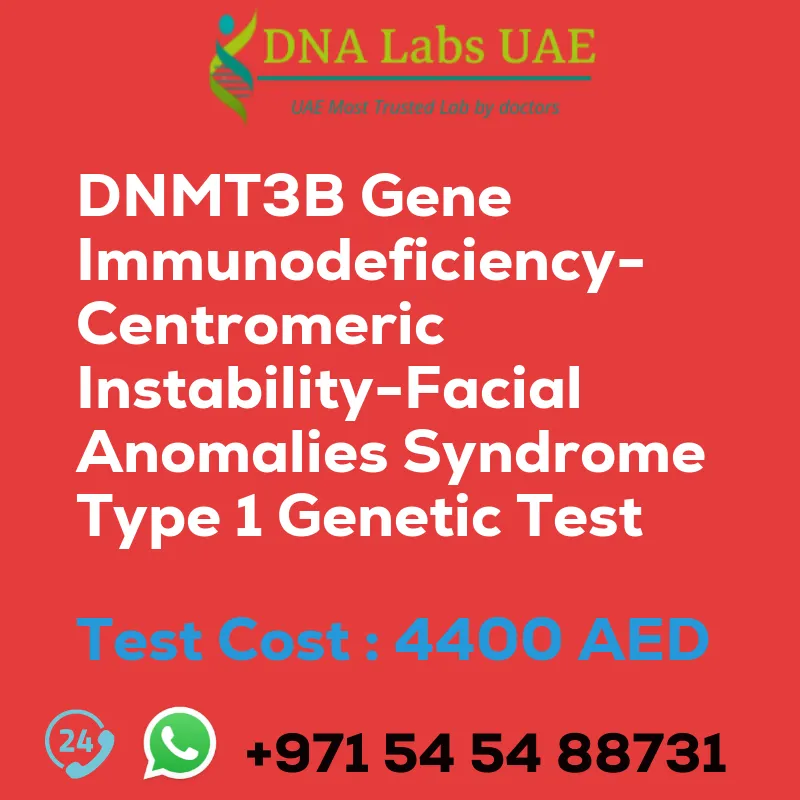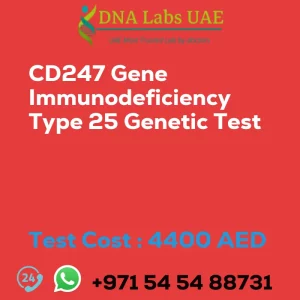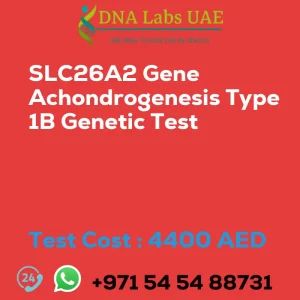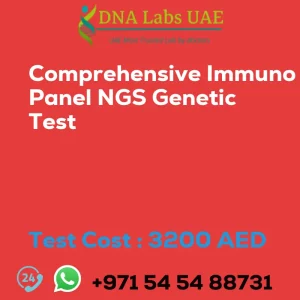DNMT3B Gene Immunodeficiency-centromeric instability-facial anomalies syndrome type 1 Genetic Test
Test Name: DNMT3B Gene Immunodeficiency-centromeric instability-facial anomalies syndrome type 1 Genetic Test
Components: Blood or Extracted DNA or One drop Blood on FTA Card
Price: 4400.0 AED
Sample Condition: Blood or Extracted DNA or One drop Blood on FTA Card
Report Delivery: 3 to 4 Weeks
Method: NGS Technology
Test type: Osteology Dermatology Immunology Disorders
Doctor: Dermatologist
Test Department: Genetics
Pre Test Information: Clinical History of Patient who is going for DNMT3B Gene Immunodeficiency-centromeric instability-facial anomalies syndrome type 1 NGS Genetic DNA Test. A Genetic Counselling session to draw a pedigree chart of family members affected with DNMT3B Gene Immunodeficiency-centromeric instability-facial anomalies syndrome type 1 NGS Genetic DNA Test gene DNMT3B
Test Details: DNMT3B gene immunodeficiency-centromeric instability-facial anomalies syndrome type 1 (ICF1) is a rare genetic disorder characterized by immunodeficiency, centromeric instability, and facial anomalies. It is caused by mutations in the DNMT3B gene, which plays a role in DNA methylation and gene regulation. NGS (Next-Generation Sequencing) genetic testing is a type of genetic testing that uses advanced sequencing technologies to analyze multiple genes simultaneously. In the case of ICF1, NGS genetic testing can be used to identify mutations or variants in the DNMT3B gene that are associated with the syndrome. NGS genetic testing for ICF1 involves obtaining a DNA sample, typically through a blood sample, and analyzing the DNA for mutations or variants in the DNMT3B gene. The DNA sample is sequenced using NGS technologies, which can identify specific changes in the DNA sequence. The results of the test can then be used to confirm a diagnosis of ICF1 and provide information about the specific genetic mutation or variant present. NGS genetic testing for ICF1 can be useful for individuals who have symptoms or a family history suggestive of the syndrome. It can help confirm a diagnosis, provide information about the genetic cause of the syndrome, and guide treatment and management options. Genetic counseling is often recommended before and after NGS genetic testing to discuss the implications of the test results and provide support to individuals and families affected by ICF1.
| Test Name | DNMT3B Gene Immunodeficiency-centromeric instability-facial anomalies syndrome type 1 Genetic Test |
|---|---|
| Components | |
| Price | 4400.0 AED |
| Sample Condition | Blood or Extracted DNA or One drop Blood on FTA Card |
| Report Delivery | 3 to 4 Weeks |
| Method | NGS Technology |
| Test type | Osteology Dermatology Immunology Disorders |
| Doctor | Dermatologist |
| Test Department: | Genetics |
| Pre Test Information | Clinical History of Patient who is going for DNMT3B Gene Immunodeficiency-centromeric instability-facial anomalies syndrome type 1 NGS Genetic DNA Test. A Genetic Counselling session to draw a pedigree chart of family members affected with DNMT3B Gene Immunodeficiency-centromeric instability-facial anomalies syndrome type 1 NGS Genetic DNA Test gene DNMT3B |
| Test Details |
DNMT3B gene immunodeficiency-centromeric instability-facial anomalies syndrome type 1 (ICF1) is a rare genetic disorder characterized by immunodeficiency, centromeric instability, and facial anomalies. It is caused by mutations in the DNMT3B gene, which plays a role in DNA methylation and gene regulation. NGS (Next-Generation Sequencing) genetic testing is a type of genetic testing that uses advanced sequencing technologies to analyze multiple genes simultaneously. In the case of ICF1, NGS genetic testing can be used to identify mutations or variants in the DNMT3B gene that are associated with the syndrome. NGS genetic testing for ICF1 involves obtaining a DNA sample, typically through a blood sample, and analyzing the DNA for mutations or variants in the DNMT3B gene. The DNA sample is sequenced using NGS technologies, which can identify specific changes in the DNA sequence. The results of the test can then be used to confirm a diagnosis of ICF1 and provide information about the specific genetic mutation or variant present. NGS genetic testing for ICF1 can be useful for individuals who have symptoms or a family history suggestive of the syndrome. It can help confirm a diagnosis, provide information about the genetic cause of the syndrome, and guide treatment and management options. Genetic counseling is often recommended before and after NGS genetic testing to discuss the implications of the test results and provide support to individuals and families affected by ICF1. |








